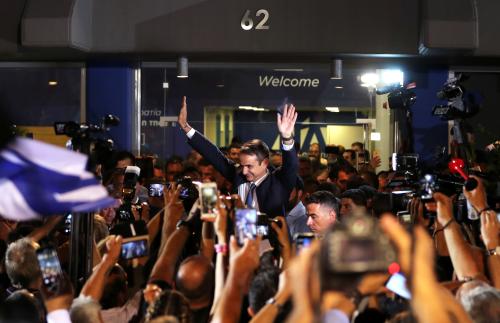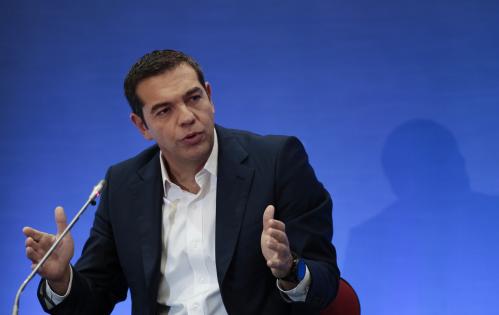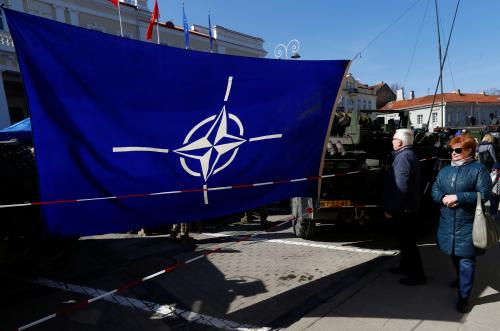As the world focuses on U.S.-North Korea negotiations, today’s announcement of a resolution to the long-standing disagreement between Greece and Macedonia over the latter’s name is testament to the triumph of patient diplomacy. While successive U.S. administrations have actively supported this effort, the Trump administration deserves kudos for quiet engagement that helped push it over the line.
The name dispute dates to the break-up of Yugoslavia in 1991, when the country declared independence as the Republic of Macedonia. Athens objected to international recognition of the new country’s name, which it shared with a region in northern Greece, given concerns it could imply territorial claims. As a compromise, the country joined the United Nations in 1993 under a provisional name (the Former Yugoslav Republic of Macedonia). Following a 19-month Greek trade embargo, Macedonia amended its constitution and changed its flag in 1995. However, Greece blocked it from joining NATO or beginning accession talks with the European Union (EU) until the name issue was definitively resolved.
After years of failed efforts, the politics were ripe in both countries for a deal. In Macedonia, the lack of progress on Euro-Atlantic integration contributed to democratic backsliding over the last decade. The government of Prime Minister Nikola Gruevski took actions that provoked its southern neighbor. In 2006 it named Skopje airport after Alexander the Great (the ancient Greek king who controlled territory that included the Greek region of Macedonia), and in 2011 it erected a 72-foot statue of him in the capital. Following a two-year political crisis dominated by a corruption scandal and violence in parliament, the election of Prime Minister Zoran Zaev last summer marked the first change of power in 11 years. His center-left government faced a weak economy, tense ethnic relations, and deteriorating political institutions. Motivated to resolve the name issue, he undid the airport and statue irritants as goodwill gestures.
Zaev found a ready partner in Greek Prime Minister Alexis Tsipras, who was free from the ideological baggage that plagued his predecessors, politically secure following his September 2015 re-election, and prepared to engage in pragmatic negotiations. Having initially being seen as a pariah in Europe given his unorthodox political views and the country’s economic difficulties, the deal helps recast him as a problem-solver and regional leader. After launching negotiations last year, these young, progressive prime ministers found common ground and demonstrated political courage in making difficult compromises.
Earlier today, Tsipras and Zaev spoke by phone to finalize the deal. Tsipras broke the “good news” when he informed Greek President Prokopis Pavlopoulos during a televised meeting that an agreement had been reached. In a press conference, he announced the country’s new name will be the Republic of North Macedonia (Severna Makedonija), a compound name with a geographic modifier to distinguish the country from neighboring Greek territory. Macedonia will change its constitutional name for all uses (“erga omnes”) and remove any elements perceived as irredentist. Its language will be Macedonian and its people known as Macedonians (citizens of the Republic of North Macedonia). Zaev held a simultaneous press conference. The leaders will sign the agreement this weekend on the shores of Lake Prespa along their countries’ borders.
This agreement comes just in time to finalize preparations before the EU Council meeting later this month and the NATO summit in July. Both institutions will likely extend provisional invitations with conditions. NATO should be a smoother process, as the Alliance was ready to invite Macedonia at the 2008 Bucharest summit along with neighboring Albania and Croatia; all member states will need to ratify the accession treaty. EU membership will take more time: further reforms are needed in Skopje, plus Dutch and French leaders have voiced opposition to widening the union before addressing internal weaknesses.
A difficult road remains ahead, as both Greece and Macedonia have faced large-scale protests in recent weeks with more to come. Greek Defense Minister and Tsipras’ right-wing coalition partner, Panos Kammenos, has already warned his party will not support any name that includes the word “Macedonia”; however, he will not bring down the government, especially as Greece prepares to exit its third international financial bailout in August. In Skopje, President Gjorge Ivanov has previously said any deal should not require changes to the country’s constitution or name used domestically. There are also concerns that Russia, which opposes NATO expansion, has launched a disinformation campaign to stoke opposition. The government needs to ratify the bilateral agreement in parliament, hold a referendum (which it has promised by the fall), and reform the constitution. Only then will the Greek government ratify the agreement. With Greek elections expected in the next year, lengthy delays on the Macedonian side could scupper the deal if Tsipras fails to get re-elected.
The United States has been engaged in quiet diplomacy in recent months, led by Assistant Secretary of State for European Affairs Wess Mitchell and supported by ambassadors in Athens and Skopje. During a March visit to the region, Mitchell rightly observed that conditions for reaching a compromise were “better than they have ever been.” Senior administration figures have given their support: Defense Secretary Jim Mattis met Macedonian Defense Minister Radmila Shekerinska in early May, Vice President Mike Pence called Greek Prime Minister Tsipras in mid-May, and Greek Foreign Minister Nikos Kotzias met Secretary of State Mike Pompeo and National Security Advisor John Bolton in Washington several days later. Special credit goes to Matthew Nimetz, a 78-year-old American diplomat who has served as the United Nations Special Representative for the name issue since 1999. The European Union stepped up its engagement in recent months, holding its first EU-Western Balkans summit in 15 years in May. Other European leaders also conveyed support, with German Chancellor Angela Merkel hosting Zaev in Berlin in February and British Prime Minister Theresa May visiting Skopje in mid-May.
Today’s agreement will give Athens the reassurance of having a neighbor that is a NATO ally on the path to EU membership, boost Skopje’s feeling of belonging in the international community, and increase trade and investment ties between them. Euro-Atlantic integration will help consolidate Macedonia’s democracy, free market reforms, and fight against corruption. It will also counter the growing influence of third countries (particularly Russia, Saudi Arabia, and Turkey) in the Western Balkans. Finally, the resolution of this long-running dispute provides hope in a conflict-filled region and attests to the value of sustained diplomatic engagement.
The Brookings Institution is committed to quality, independence, and impact.
We are supported by a diverse array of funders. In line with our values and policies, each Brookings publication represents the sole views of its author(s).











Commentary
Diplomacy triumphs: Greece and Macedonia resolve name dispute
June 12, 2018